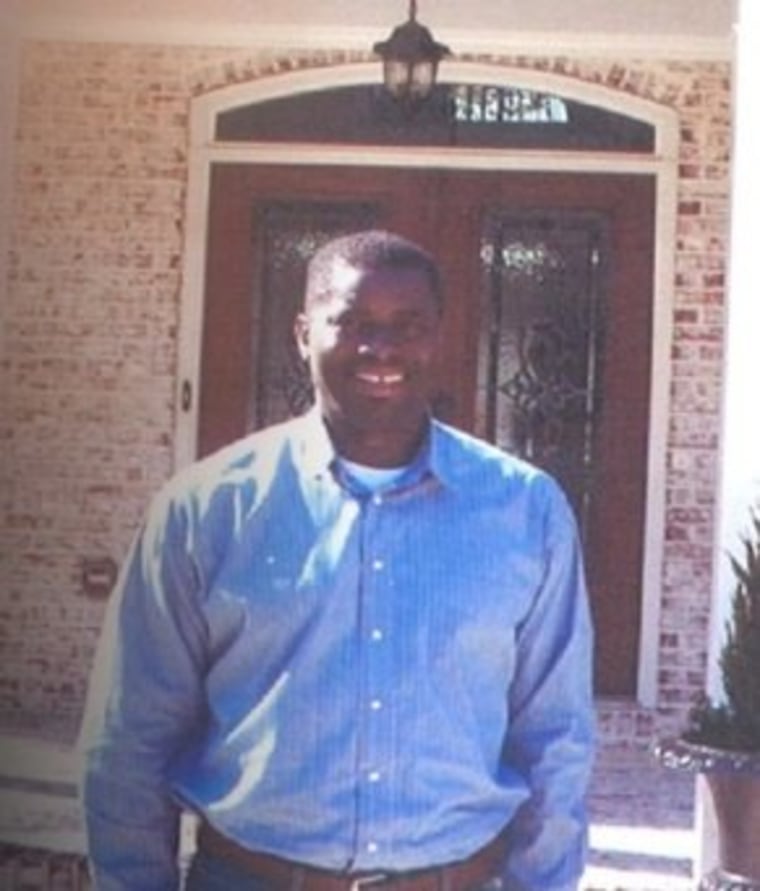Now that George Zimmerman has been arrested and charged with murder in the shooting death of Trayvon Martin, we can expect to see an even greater focus on the "legalese," so to speak. His (new) attorney indicated that Zimmerman will plead not guilty to the 2nd-degree murder charge; by Florida law, per the state's standard jury instructions. that means special prosecutor Angela Corey is alleging that when he shot Trayvon, he did so with a "depraved mind," and "without regard to human life."
That indicates that Corey didn't buy Zimmerman's claims of self-defense in the shooting. It remains to be seen whether or not Zimmerman's defense in court will claim Florida's "stand your ground" law applies to him. Still, this is just the beginning, and it's likely that the NRA-backed Florida law and its dozens of legislative descendants, fathered in part by ALEC, will remain a front-page topic.
So while we're talking, it's worth chatting about the Georgia version, and black homeowner John McNeil (pictured at right).
It has been just over six years since McNeil and his wife hired Brian Epp's construction company to build them a house in Cobb County, Georgia. Epp, who was white, became "increasingly threatening" to the McNeils, and they closed on the house early simply to be rid of him, ordering him to stay off the property once his work was completed. Epp didn't comply, and that had fatal consequences.
Rania Khalek detailed the confrontation in Salon:
On Dec. 6, 2005, John McNeil’s 15-year-old son, La’Ron, notified his dad over the phone that a man he didn’t recognize was lurking in the backyard. When La’Ron told the man to leave, an argument broke out. McNeil was still on the phone and immediately recognized Epp’s voice. According to La’Ron’s testimony, Epp pointed a folding utility knife at La’Ron’s face and said, “[w]hy don’t you make me leave?” at which point McNeil told his son to go inside and wait while he called 911 and headed home.According to McNeil’s testimony, when he pulled up to his house, Epp was next door grabbing something from his truck and stuffing it in his pocket. McNeil quickly grabbed his gun from the glove compartment in plain view of Epp who was coming at him “fast.” McNeil jumped out of the car and fired a warning shot at the ground insisting that Epp back off. Instead of retreating, Epp charged at McNeil while reaching for his pocket, so McNeil fired again, this time fatally striking Epp in the head. (Epp was found to have a folding knife in his pocket, although it was shut.)
It was over a year before the Cobb County District Attorney charged him with murder, and McNeil was convicted and sentenced to life in prison. A 2008 appeal to the Georgia Supreme Court upheld that conviction -- with Justice Leah Ward Sears dissenting -- despite the fact that the state, per Khalek's report, has both a "stand your ground" law that permits citizens to use deadly force “only if he or she reasonably believes that such force is necessary to prevent death or great bodily injury,” as well as a Castle Doctrine law, which justifies the use of deadly force in defense of one’s home.
Civil rights activist Markel Hutchins has filed a lawsuit in Georgia seeking to strike the "stand your ground" law:
According to the suit, some courts have "accepted the race of a victim as evidence to establish the reasonableness of an individual’s fear in cases of justifiable homicide." Hutchins said in those circumstances the law does not equally protect him and other African Americans.
Judging by Hutchins' remarks, it seems he's trying to prevent more shooting victims, more Trayvon Martins. But if the law doesn't even equally protect people like John McNeil, shooting to protect their property, their loved ones, and themselves, it stands to question what good the law does at all.
More of what is on our radar this morning:
- Mitt Romney tried to co-opt "war on women" as a talking point for his benefit, and failed spectacularly. And I'm being kind.
- Fast-food chain Wendy's, which has funded conservative causes in the past, is now the latest to pull out of ALEC.
- Speaking of ALEC, can there be a progressive version?
- North Korea is about to test a long-range missile, and no one can seem to do much to stop it.
- Barney Frank calls Paul Ryan's budget a "scam."
- A new poll shows that for the first time, a majority of Republicans don't believe the war in Afghanistan is worth fighting.
- Will a failing private prison kill a Georgia town?
- Trayvon Martin's parents, Tracy Martin and Sybrina Fulton, were guests on a number of msnbc programs last night after the charges were announced. In the video below, they talk to NBC News' Brian Williams on "Rock Center."
